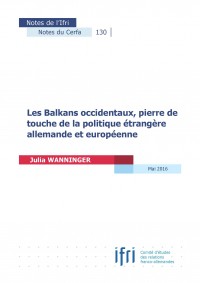Gateway to Think Tanks
| 来源类型 | Publications - Policy Papers - Notes du Cerfa |
| 规范类型 | 简报 |
| The Western Balkans : a touchstone for German and European foreign policy Notes du Cerfa, n° 130, May 2016. | |
| Julia WANNINGER | |
| 发表日期 | 2016-05-24 |
| 出处 | Notes du Cerfa |
| 出版年 | 2016 |
| 概述 | Germany’s policy towards the Western Balkans is marked by continuous commitment that put different emphasis in different phases : reconstruction, stabilisation, consolidation of rule of law and market economy as well as member state-building. |
| 摘要 |
The Western Balkans : a touchstone for German and European foreign policy Notes du Cerfa, n° 130, May 2016.
Germany’s policy towards the Western Balkans is marked by continuous commitment that put different emphasis in different phases : reconstruction, stabilisation, consolidation of rule of law and market economy as well as member state-building.
 The Western Balkans play a central role for German foreign policy just as for EU foreign policy. The Kosovo conflict in 1999 confronted German foreign policy practitioners with a decision between "never again war" and "never again Auschwitz". At the same time the Western Balkans remind of the EU’s promise to share peace, prosperity and solidarity with its South-eastern European neighbors, too. Although the topic of migration currently dominates bilateral relations with the Western Balkans, German foreign policy can mainly be understood as a contribution to a committed EU enlargement policy.
Since autumn 2013, the federal government of CDU/CSU and SPD has set new priorities in its policy towards the Western Balkans, e.g. the British-German initiative for Bosnia Herzegovina in November 2014 or the annual Western Balkans Summit that have been taking place since August 2014. In both cases the federal government has opted for joint initiatives with European partners or the continuation of its initiatives by other EU member states or the EU institutions. France will host the Western Balkans Summiton July 4, 2016.
The Western Balkans Summits bear the potential to increase confidence into their European future among the population of the six Western Balkans countries. They also promote regional cooperation and contribute towards anchoring the necessary mechanisms for coordination and cooperation between EU member states. At the same time, they bear the risk of diverting attention of political elites away from lengthy rule of law-related reforms to mid-term projects. Germany and France should advocate the EU’s further active support for a continuation of democratic and market economy reforms in the Western Balkans.
Julia Wanninger is Office manager and Research assistant of Knut Fleckenstein (MEP).
This content is available in French and German.
|
| 关键词 | Foreign policy Balkans Europe European Union Germany |
| URL | https://www.ifri.org/en/publications/notes-de-lifri/notes-cerfa/western-balkans-touchstone-german-and-european-foreign |
| 来源智库 | French Institute of International Relations (France) |
| 资源类型 | 智库出版物 |
| 条目标识符 | http://119.78.100.153/handle/2XGU8XDN/416175 |
| 推荐引用方式 GB/T 7714 | Julia WANNINGER. The Western Balkans : a touchstone for German and European foreign policy Notes du Cerfa, n° 130, May 2016.. 2016. |
| 条目包含的文件 | ||||||
| 文件名称/大小 | 资源类型 | 版本类型 | 开放类型 | 使用许可 | ||
| ndc_130_j.wanninger_(27KB) | 智库出版物 | 限制开放 | CC BY-NC-SA |  浏览 | ||
除非特别说明,本系统中所有内容都受版权保护,并保留所有权利。